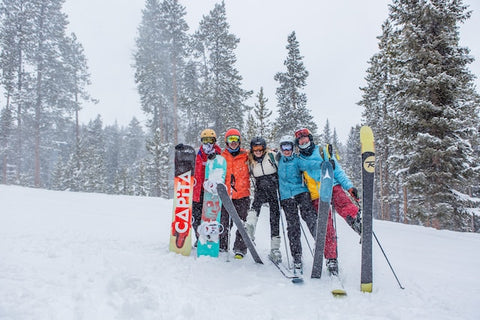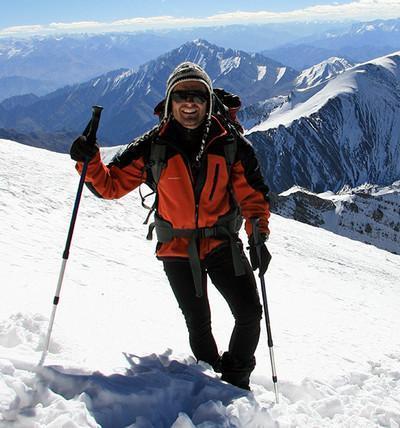Are you looking to enjoy winter sports for the first time during your break? Then you need more than just mental preparation.
Skiing, as exciting as it is, also requires the right equipment that's ideal for your specific needs.
Here, we have a few tips to help you prepare for your first ski trip.
Decide on the Skiing Type
The first port of call is to figure out what type of skiing you will be doing. For those unaware, there are two main types of skiing, Alpine and Nordic. Alpine, or downhill skiing, mainly relies on gravity to propel a skier. For this, the whole boot is bound to the ski.
On the other hand, nordic skiing involves skiing across flat terrain. This is also called cross-country skiing. In Nordic skiing, only the front of the boot is attached to the ski. Clearly, the gear you choose will depend on your preferred type of skiing.

Sign Up For a Lesson
You might be wondering why we are discussing lessons when talking about gear. Well, when you are a beginner, you are better off taking a couple of lessons to get started. You can do this during the weekend.
For students, this might mean finishing assignments in advance during the weekdays. For this, you can get help from thesis writing service with your assignments, but it would be well worth the time. Not only will this help you find your footing in the snow.
But more importantly, the trainer can guide you in shopping for the right gear. Although a shopkeeper can help you, your trainer will tell you what to look for. There are both group and private ski lessons available suitable for different budgets.
Find Equipment for Your Skill Level
To continue with the previous idea, skill level has to be considered when choosing equipment. For example, if you are a total novice, you need equipment that is easy to handle and forgiving. This includes shorter and softer skis. These are easier to turn in the snow. Similarly, you also need comfortable boots that can provide good support.
As you gain more experience, you can opt for aggressive equipment that can facilitate higher speeds and help you navigate through challenging terrain.
Consider Your Height and Weight
Aside from the skill set, height and weight should also be considered when choosing skiing equipment. For example, if you are a petite beginner skier, the length of the skis must also be short (10-15cm less than your height). On the other hand, if you are taller and heavier, then longer skis are required to provide you with the needed stability and control.
Similarly, the choice of boots is also affected by the skier's build. A taller and heavier skier needs boots with a stiffer reflex for better control. And lighter skiers prefer boots with a softer flex, as it provides them with more maneuverability and flexibility.
Don't Overlook the Right Helmet
For first-time student skiers, safety is paramount. It's crucial to ensure that your ski helmet fits properly. Simply put, the helmet should snugly fit but shouldn't be too tight or move sound on your head. You can also look for helmets with adjustable sizing systems. For instance, a dial or a strap can ensure a secure fit.
Beginners can also look for helmets with adjustable vents. These can be opened or closed depending on the weather conditions. Additionally, also check whether the helmet has a visor or has to be worn with goggles. If you prefer separate goggles, make sure the helmet is compatible with your preferred goggles.
Choosing the Right Ski Clothing
While clothing isn't technically part of the equipment, it's necessary for comfort and performance. On mountains, the weather can change drastically in an instant. Here is what you need to pack when setting out to one of your favorite European towns for skiing.
Base and middle layers
These are what you wear under your jacket and pants. Synthetic or wool is preferred, and preferably, they should also be breathable. If it's very cold, you should also add a mid-layer over the base, such as a fleece.
Ski jacket and pants
Of course, the top layers should also be warm and insulated. They should also be wind and water-resistant. Weatherproof clothing is necessary to keep you comfortable and dry regardless of the conditions.

Gloves and mittens
Another important item to buy is insulated gloves or mittens. Your hands will be in contact with snow all day, and waterproof gloves are a necessity. They should also provide you with enough dexterity to hold on to the poles.
Socks
Finally, keeping your feet dry is important for an enjoyable skiing session. It's necessary to buy socks specific to skiing. Beginners tend to buy normal thermal socks, but they might be too thick for skiing.
The right material is the key. Moreover, you should also carry at least two ski socks for a single session. You might need to change it during lunch to keep your feet dry.
Carry an Essentials Backpack
Other than equipment, there are a few items that can help you go through a ski day without any issues. We suggest you pack a backpack with essentials when you head out. This backpack should contain sunscreen, beanies, lip protection, a medical kit, sunglasses, a neck warmer, energy bars, and other items that are essential to you.
Of course, these will be available at the local shops or at the ski resort. Nevertheless, it wouldn't hurt to be prepared.
Have Fun!
By following what we discussed here, you will be well-ready to hit the slopes. So, don't wait around to try skiing. Search for the best essay services, delegate your college work for a short while, take ski lessons, and shop around. When done right, skiing can be one of the best memorable experiences of your life.
If you are unsure about what to buy, don't hesitate to reach out to a professional. They can assess your needs and help you find the right equipment that fits your size, skill level, and budget.
ABOUT THE AUTHOR
Fred Felton
Content Creator / Editor
Fred Felton is a copywriter, editor and social media specialist based in Durban, South Africa. He has over 20 years of experience in creating high end content. He has worked with some of the biggest brands in the world. Currently Fred specialises in the winter outdoors space, focussing on skiing and snowboarding. He is also a keynote speaker and has presented talks and workshops in South Africa.






